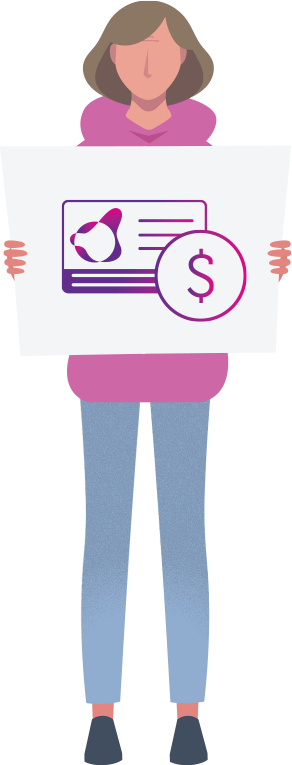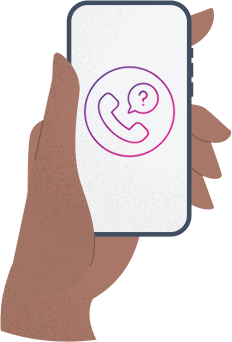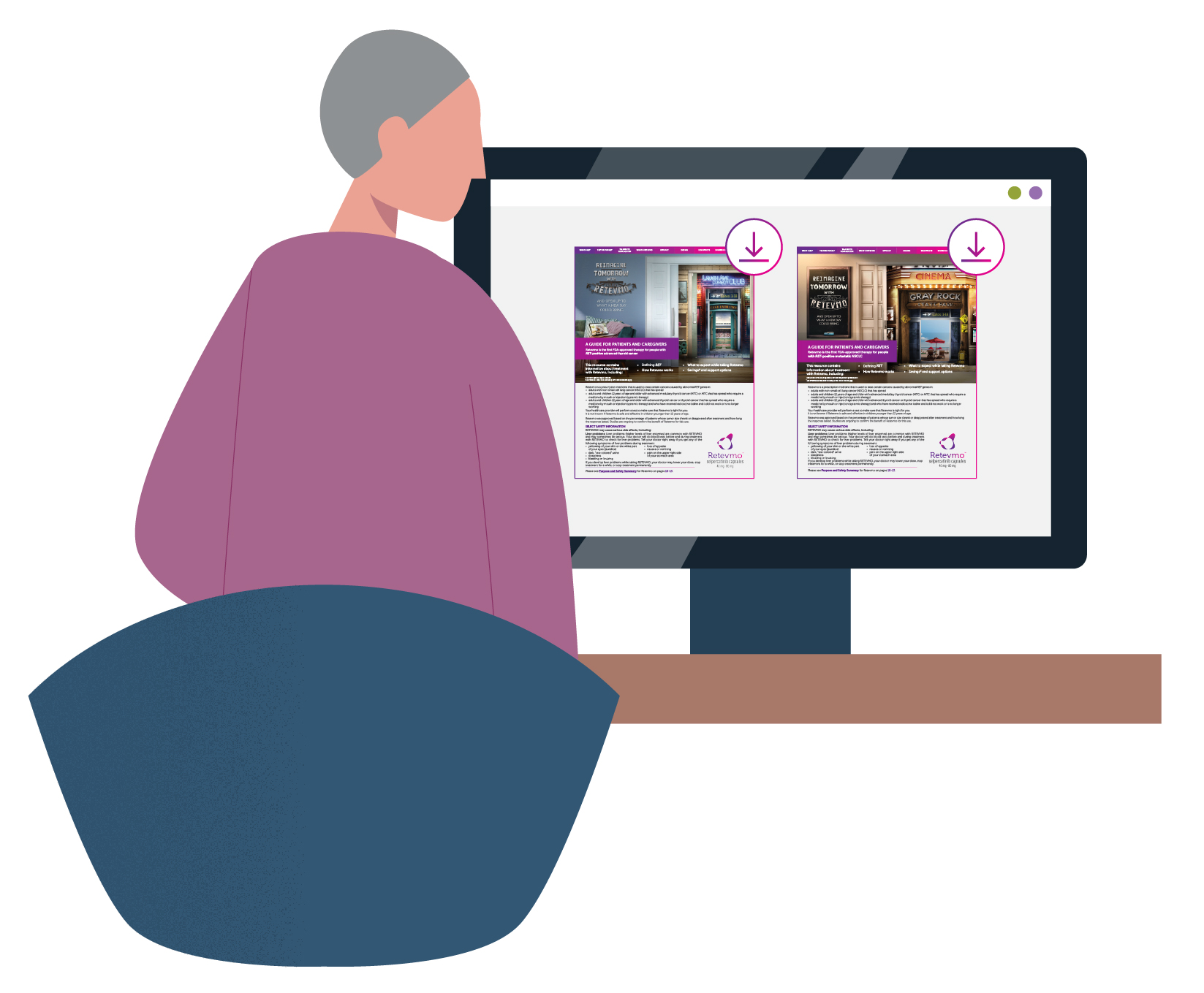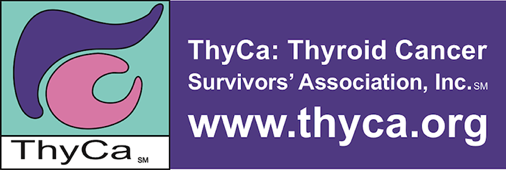WARNINGS
RETEVMO may cause serious side effects, including:
Liver problems: Liver problems (higher levels of liver enzymes) are common with RETEVMO and may sometimes be serious. Your doctor will do blood tests before and during treatment with RETEVMO to check for liver problems. Tell your doctor right away if you get any of the following symptoms of liver problems during treatment:
- yellowing of your skin or the white part of your eyes (jaundice)
- dark, “tea-colored” urine
- sleepiness
- bleeding or bruising
- loss of appetite
- nausea or vomiting
- pain on the upper right side of your stomach area
Lung problems: RETEVMO may cause severe or life-threatening inflammation (swelling) of the lungs during treatment, that can lead to death. Tell your doctor right away if you get any new or worsening lung symptoms, including:
- shortness of breath
- cough
- fever
High blood pressure (hypertension): High blood pressure is common with RETEVMO. It may sometimes be severe. You should check your blood pressure regularly during treatment with RETEVMO. If you develop blood pressure problems, your healthcare provider may prescribe medicine to treat your high blood pressure. Tell your doctor if you have increased blood pressure readings or get any symptoms of high blood pressure, including:
- confusion
- headaches
- shortness of breath
- dizziness
- chest pain
Heart rhythm changes (QT prolongation). RETEVMO may cause very slow, very fast, or irregular heartbeats. Your healthcare provider may perform tests before and during treatment with RETEVMO to check the activity of your heart and the levels of body salts (electrolytes) and thyroid-stimulating hormone (TSH) in your blood. Tell your doctor right away if you get any of the following symptoms:
- loss of consciousness
- fainting
- dizziness
- a change in the way your heart beats (heart palpitations)
Bleeding problems: RETEVMO can cause bleeding, which can be serious and may lead to death. Tell your doctor if you have any signs of bleeding during treatment, including:
- vomiting blood or if your vomit looks like coffee-grounds
- pink or brown urine
- red or black stools that look like tar
- coughing up blood or blood clots
- unusual bleeding or bruising of your skin
- menstrual bleeding that is heavier than normal
- unusual vaginal bleeding
- nose bleeds that happen often
- drowsiness or difficulty being awakened
- confusion
- headache
- change in speech
Allergic reactions: RETEVMO can cause a fever, rash, or pain in muscles or joints, especially during the first month of treatment. Tell your doctor if you get any of these symptoms.
Tumor lysis syndrome (TLS): TLS is caused by a fast breakdown of cancer cells. TLS can cause you to have kidney failure and the need for dialysis treatment, an abnormal heartbeat, and can lead to hospitalization. Your healthcare provider may do blood tests to check you for TLS. You should stay well hydrated during treatment with RETEVMO. Call your healthcare provider or get emergency medical help right away if you develop any of these symptoms during treatment with RETEVMO:
- nausea
- vomiting
- weakness
- swelling
- shortness of breath
- muscle cramps
- seizures
Risk of wound healing problems: Wounds may not heal well during treatment with RETEVMO. Tell your doctor if you plan to have any surgery before or during treatment with RETEVMO.
- You should stop taking RETEVMO at least 7 days before planned surgery.
- Your doctor should tell you when you may start taking RETEVMO again after surgery.
Low thyroid hormone levels in your blood (hypothyroidism). Your healthcare provider will do blood tests to check your thyroid function before and during treatment with RETEVMO. Tell your healthcare provider right away if you develop signs or symptoms of low thyroid hormone levels, including:
- weight gain
- feeling cold
- tiredness that worsens or does not go away
- constipation
Common side effects
The most common side effects of RETEVMO are:
- swelling of your arms, legs, hands, and feet (edema)
- diarrhea
- tiredness
- dry mouth
- high blood pressure
- stomach-area (abdominal) pain
- constipation
- rash
- nausea
- headache
The most common severe abnormal laboratory test results with RETEVMO include decreased white blood cell count, increased liver enzymes, decreased levels of sodium in the blood, and decreased levels of calcium in the blood.
RETEVMO may affect the ability to have children for both females and males. Talk to your doctor if you want to have children and you are thinking about starting treatment with RETEVMO.
- RETEVMO can harm your unborn baby. You should not become pregnant during treatment with RETEVMO.
- If you are able to become pregnant:
- Your doctor will do a pregnancy test before you start treatment with RETEVMO.
- You should use effective birth control (contraception) during treatment and for 1 week after your last dose of RETEVMO. Talk to your doctor about birth control methods that may be right for you.
- Tell your doctor right away if you become pregnant or think you might be pregnant during treatment with RETEVMO.
- Males with partners who are able to become pregnant should use effective birth control during treatment with RETEVMO and for 1 week after your last dose of RETEVMO.
These are not all the possible side effects with RETEVMO. If you are concerned about side effects, talk to your doctor. Tell your doctor about any side effects you have. You can also report side effects at 1-800-FDA-1088 or www.fda.gov/medwatch.
Before using
Before taking RETEVMO, tell your doctor about all your medical conditions, including if you:
- have liver problems
- have lung or breathing problems other than lung cancer
- have high blood pressure
- have heart problems, including a condition called QT prolongation
- have bleeding problems
- plan to have surgery. You should stop taking RETEVMO at least 7 days before your planned surgery.
- are pregnant or plan to become pregnant. See section above for additional information.
- are breastfeeding or plan to breastfeed. It is not known if RETEVMO passes into your breast milk. Do not breastfeed during treatment with RETEVMO and for 1 week after your last dose.
Also tell your doctor about all the medicines you take, including prescription and over-the-counter medicines, vitamins, and herbal supplements. RETEVMO may affect the way other medicines work and other medicines may affect how RETEVMO works, and may increase your risk of side effects.
-
You should avoid taking certain medicines when also taking RETEVMO. These include:
- St. John’s wort,
- proton-pump inhibitors (PPIs) such as dexlansoprazole, esomeprazole, lansoprazole, omeprazole, pantoprazole sodium, and rabeprazole,
- H2 blockers such as famotidine, nizatidine, and cimetidine,
- antacids that contain aluminum, magnesium, calcium, simethicone, or buffered medicines.
If you cannot avoid taking PPIs, H2 blockers, or antacids, see the “How to take with certain other medicines” section below for more information. Know the medicines you take. Keep a list of them to show your doctor and pharmacist when you get a new medicine.
How to take RETEVMO
- Take RETEVMO exactly as your doctor tells you.
- Your doctor may change your dose, temporarily stop, or permanently stop treatment with RETEVMO if you have side effects. Do not change your dose or stop taking RETEVMO unless your doctor tells you.
- Swallow RETEVMO capsules whole. Do not crush or chew the capsules.
- RETEVMO is taken by mouth, usually 2 times a day, about 12 hours apart.
- Take RETEVMO with or without food.
- If you vomit after taking a dose of RETEVMO, do not take an extra dose. Take the next dose of RETEVMO at your scheduled time.
- Do not take a missed dose of RETEVMO unless it is more than 6 hours until your next scheduled dose.
- If you take too much RETEVMO, call your doctor or go to the nearest hospital emergency room right away.
How to take RETEVMO with certain other medicines
- If you take a PPI (such as dexlansoprazole, esomeprazole, lansoprazole, omeprazole, pantoprazole sodium, or rabeprazole), take RETEVMO with food.
- If you take an antacid that contains aluminum, magnesium, calcium, simethicone, or buffered medicines, take RETEVMO 2 hours before or 2 hours after taking the antacid.
- If you take an H2 blocker (such as famotidine, nizatidine, or cimetidine), take RETEVMO 2 hours before or 10 hours after taking the H2 blocker.
Learn more
RETEVMO is a prescription medicine. For more information, call 1-800-545-5979 or go to www.Retevmo.com.
This summary provides basic information about RETEVMO. It does not include all information known about this medicine. Read the information that comes with your medicine each time your prescription is filled. This information does not take the place of talking with your doctor. Be sure to talk to your doctor or other health care provider about RETEVMO and how to take it. Your doctor is the best person to help you decide if RETEVMO is right for you.
SE CON BS ALL 15FEB2023
RETEVMO® is a registered trademark owned or licensed by Eli Lilly and Company, its subsidiaries, or affiliates.












